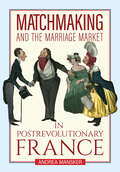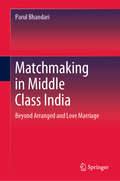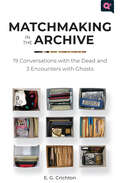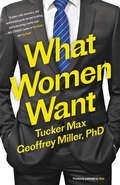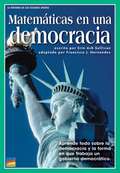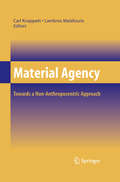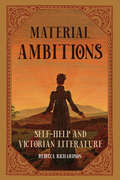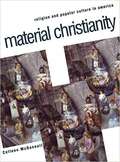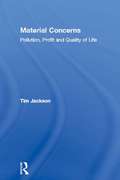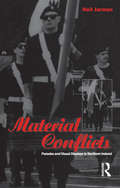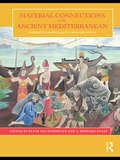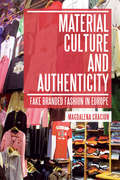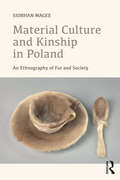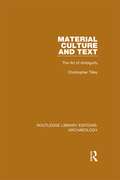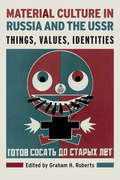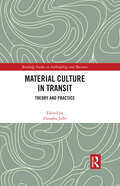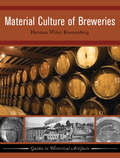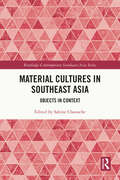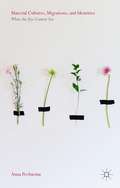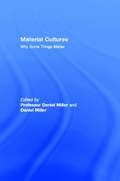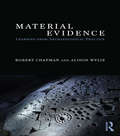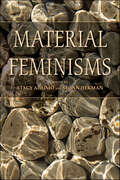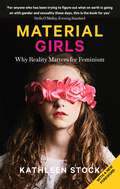- Table View
- List View
Matchmaking and the Marriage Market in Postrevolutionary France
by Andrea ManskerMatchmaking and the Marriage Market in Postrevolutionary France uncovers the unexplored history of matrimonial agents, their novel marketing tactics, and the rise of personal advertisements to track the commercialization of marriage in nineteenth-century France. Brokers transformed courtship and marriage into forms of commercial exchange, linking them to the burgeoning urban values of abundance, pleasure, and social mobility. By studying agents' and readers' media fictions on love alongside court cases, legislation, and literature surrounding the industry, Andrea Mansker reveals the intimate and socioeconomic pressures of finding a spouse. At the same time, she demonstrates how contemporaries used the business of matrimony to reimagine their public identities, relationships, and courtship rituals following unprecedented historical change due to the French Revolution and Napoleonic wars. The matchmaking business both responded to and helped shape national anxieties over fluctuating nuptial rates and changing laws on marriage and divorce. As a result, marriage itself was reconceived as a commercial contract inseparable from the atomistic and corrupt marketplace. The debates and pressures Mansker describes in Matchmaking and the Marriage Market in Postrevolutionary France are still relevant today. As contemporary online daters likely understand, the possibility of finding a mate in an expanded pool of candidates beyond one's family, locality, and nation offered individuals the liberating opportunity to explore new personas just as it produced a novel sense of danger about these impersonal transactions in the anonymous marketplace.
Matchmaking in Middle Class India: Beyond Arranged and Love Marriage
by Parul BhandariThis book is an extensive and thorough exploration of the ways in which the middle class in India select their spouse. Using the prism of matchmaking, this book critically unpacks the concept of the 'modern' and traces the importance of moralities and values in the making of middle class identities, by bringing to the fore intersections and dynamics of caste, class, gender, and neoliberalism. The author discusses a range of issues: romantic relationships among youth, use of online technology and of professional services like matrimonial agencies and detective agencies, encounters of love and heartbreak, impact of experiences of pain and humiliation on spouse-selection, and the involvement of family in matchmaking. Based on this comprehensive account, she elucidates how the categories of 'love' and 'arranged' marriages fall short of explaining, in its entirety and essence, the contemporary process of spouse-selection in urban India. Though the ethnographic research has been conducted in India, this book is of relevance to social scientists studying matchmaking practices, youth cultures, modernity and the middle class in other societies, particularly in parts of Asia. While being based on thorough scholarship, the book is written in accessible language to appeal to a larger audience.
Matchmaking in the Archive: 19 Conversations with the Dead and 3 Encounters with Ghosts (Q+ Public)
by E.G. CrichtonThough today’s LGBTQ people owe a lot to the generations who came before them, their historical inheritances are not always obvious. Working with the archives of the Gay Lesbian Bisexual Transgender Historical Society, artist E.G. Crichton decided to do something to bridge this generation gap. She selected 19 innovative LGBTQ artists, writers, and musicians, then paired each of them with a deceased person whose personal artifacts are part of the archive. Including 25 pages of vivid images, Matchmaking in the Archive documents this monumental creative project and adds essays by Jonathan Katz, Michelle Tea, and Chris Vargas, who describe their own unique encounters with the ghosts of LGBTQ history. Together, they make the archive come alive in remarkably intimate ways.
Mate: Become the Man Women Want
by Tucker Max Geoffrey MillerThe #1 bestselling pioneer of "fratire" and a leading evolutionary psychologist team up to create the dating book for guys Whether they conducted their research in life or in the lab, experts Tucker Max and Dr. Geoffrey Miller have spent the last 20+ years learning what women really want from their men, why they want it, and how men can deliver those qualities.The short answer: become the best version of yourself possible, then show it off. It sounds simple, but it's not. If it were, Tinder would just be the stuff you use to start a fire. Becoming your best self requires honesty, self-awareness, hard work and a little help.Through their website and podcasts, Max and Miller have already helped over one million guys take their first steps toward Ms. Right. They have collected all of their findings in Mate, an evidence-driven, seriously funny playbook that will teach you to become a more sexually attractive and romantically successful man, the right way:- No "seduction techniques"- No moralizing- No bullshitJust honest, straightforward talk about the most ethical, effective way to pursue the win-win relationships you want with the women who are best for you. Much of what they've discovered will surprise you, some of it will not, but all of it is important and often misunderstood. So listen up, and stop being stupid!
Material Agency
by Carl Knappett Lambros MalafourisThus far an 'agent' in the social sciences has always meant someone whose actions bring about change. In this volume, the editors challenge this position and examine the possibility that agency is not a solely human property. Instead, this collection of archaeologists, anthropologists, sociologists and other social scientists explores the symbiotic relationships between humans and material entities (a key opening a door, a speed bump raising a car) as they engage with one another.
Material Ambitions: Self-Help and Victorian Literature
by Rebecca RichardsonWhat the Victorian history of self-help reveals about the myth of individualism.Stories of hardworking characters who lift themselves from rags to riches abound in the Victorian era. From the popularity of such stories, it is clear that the Victorians valorized personal ambition in ways that previous generations had not. In Material Ambitions, Rebecca Richardson explores this phenomenon in light of the under-studied reception history of Samuel Smiles's 1859 publication, Self-Help: With Illustrations of Character, Conduct, and Perseverance. A compilation of vignettes about captains of industry, artists, and inventors who persevered through failure and worked tirelessly to achieve success in their respective fields, Self-Help links individual ambition to the growth of the nation. Contextualizing Smiles's work in a tradition of Renaissance self-fashioning, eighteenth-century advice books, and inspirational biography, Richardson argues that the burgeoning self-help genre of the Victorian era offered a narrative structure that linked individual success with collective success in a one-to-one relationship. Advocating for a broader cultural account of the ambitious hero narrative, Richardson argues that reading these biographies and self-help texts alongside fictional accounts of driven people complicates the morality tale that writers like Smiles took pains to invoke. In chapters featuring the works of Harriet Martineau, Dinah Craik, Thackeray, Trollope, and Miles Franklin, Richardson demonstrates that Victorian fiction dramatized ambition by suggesting where it runs up against the limits of an individual's energy and ability, where it turns into competition, or where it risks upsetting a socio-ecological system of finite resources. The upward mobility plots of John Halifax, Gentleman or Vanity Fair suggest the dangers of zero-sum thinking, particularly evidenced by contemporary preoccupations with Malthusian and Darwinian discourses. Intertwining the methodologies of disability studies and ecocriticism, Material Ambitions persuasively unmasks the longstanding myth that ambitious individualism can overcome disadvantageous systematic and structural conditions.
Material Christianity: Religion and Popular Culture in America
by Colleen McDannellWhat can the religious objects used by nineteenth- and twentieth-century Americans tell us about American Christianity? What is the relationship between the beliefs of the faithful and the landscapes they build? This lavishly illustrated book investigates the history and meaning of Christian material culture in America over the last 150 years. <p><p> Drawing on a rich array of historical sources and on in-depth interviews with Protestants, Catholics, and Mormons, Colleen McDannell examines the relationship between religion and mass consumption. She describes examples of nineteenth-century religious practice: Victorians burying their dead in cultivated cemetery parks; Protestants producing and displaying elaborate family Bibles; Catholics writing for special water from Lourdes reputed to have miraculous powers. And she looks at today's Christians: Mormons wearing sacred underclothing as a reminder of their religious promises, Catholics debating the design of tasteful churches, and Protestants manufacturing, marketing, and using a vast array of prints, clothing, figurines, jewelry, and toys that some label "Jesus junk" but that others see as a witness to their faith. McDannell claims that previous studies of American Christianity have overemphasized the written, cognitive, and ethical dimensions of religion, presenting faith as a disembodied system of beliefs. She shifts attention from the church and the theological seminary to the workplace, home, cemetery, and Sunday school, highlighting a different Christianity—one in which average Christians experience the divine, the nature of death, the power of healing, and the meaning of community through interacting with a created world of devotional images, environments, and objects.
Material Concerns: Pollution, Profit and Quality of Life
by Tim JacksonMaterial Concerns offers new perspectives on key environmental issues - pollution prevention, ecological economics, limits to sustainability, consumer behaviour and government policy. The first non-technical introduction to preventative environmental management, Material Concerns offers realistic prospects for improving the quality of life.
Material Conflicts: Parades and Visual Displays in Northern Ireland (Explorations in Anthropology)
by Neil JarmanThe deep and abiding sectarian divide splintering Northern Ireland has been the focus of considerable attention recently. In particular, the role parades and visual displays play in underscoring opposition has come into the spotlight with the emergence of heightened tensions, close on the heels of a tentative peace. Providing penetrating insights into the historical roots of Northern Ireland's ethnic hostilities, this timely book explores the role of images and material culture in shaping present attitudes. Ritual, identity, class and memory are shown to be potent forces informing trenchant animosities -- animosities which are visually reflected in banners and murals for unionists and nationalists alike. The pivotal role of the Twelfth of July parade in Belfast, when an estimated 100,000 either parade or watch the Orangemen, is highlighted. Anyone interested in the future of Northern Ireland and concerned about escalating conflict across the globe will warmly welcome this impressive study.
Material Connections in the Ancient Mediterranean: Mobility, Materiality and Identity
by Peter Van DommelenMaterial Connections eschews outdated theory, tainted by colonialist attitudes, and develops a new cultural and historical understanding of how factors such as mobility, materiality, conflict and co-presence impacted on the formation of identity in the ancient Mediterranean. Fighting against ‘hyper-specialisation’ within the subject area, it explores the multiple ways that material culture was used to establish, maintain and alter identities, especially during periods of transition, culture encounter and change. A new perspective is adopted, one that perceives the use of material culture by prehistoric and historic Mediterranean peoples in formulating and changing their identities. It considers how objects and social identities are entangled in various cultural encounters and interconnections. The movement of people as well as objects has always stood at the heart of attempts to understand the courses and process of human history. The Mediterranean offers a wealth of such information and Material Connections, expanding on this base, offers a dynamic, new subject of enquiry – the social identify of prehistoric and historic Mediterranean people – and considers how migration, colonial encounters, and connectivity or insularity influence social identities. The volume includes a series of innovative, closely related case studies that examine the contacts amongst various Mediterranean islands – Sardinia, Corsica, Sicily, Crete, Cyprus, the Balearics – and the nearby shores of Italy, Greece, North Africa, Spain and the Levant to explore the social and cultural impact of migratory, colonial and exchange encounters. Material Connections forges a new path in understanding the material culture of the Mediterranean and will be essential for those wishing to develop their understanding of material culture and identity in the Mediterranean.
Material Culture and Authenticity: Fake Branded Fashion in Europe (Materializing Culture)
by Magdalena CraciunThe study of material culture demonstrates that objects make people just as much as people make, exchange and consume objects. But what if these objects are, in the eyes of others, only fakes? What kind of material mirror are people looking into? Are their real selves really reflected in this mirror? This book provides an original and revealing study into engagements with objects that are not what they are claimed and presumed to be and, subsequently, are believed to betray their makers as well as users. Drawing upon an ethnography of fake branded garments in Turkey and Romania, Material Culture and Authenticity shows how people can make authentic positions for themselves in and through fake objects.The book will be of interest to students and scholars working in the fields of anthropology, material culture and cultural studies as well as to general readers interested in ethnographic alternatives to biographies of famous fakers and fakes.
Material Culture and Kinship in Poland: An Ethnography of Fur and Society (Criminal Practice Ser.)
by Siobhan MageeIn this ethnography of Krakowian society, Siobhan Magee explores essential questions on the relationship between fur and culture in Poland. How can wearing a fur coat indicate someone's political views in Krakow, beyond their opinion on animal rights? What kinds of associations are given to someone wearing a fur coat in Poland? And what impact does generational difference have on the fur-wearing traditions of modern day Krakowians? Magee looks further into detailed analyses of conversations held relating to fur, including why fur is an apt inheritance for a grandmother to pass on to her granddaughter; what it was like trading fur on 'black markets' during socialism, and why some anti-fur activists link fur to patriarchal power and the Roman Catholic Church. In so doing, it becomes clear how fur is an evocative textile with an uncommonly rich symbolic and historical significance."Magee's research uncovers the symbolic and historic significance that fur evokes in relation to culture in Poland. In her investigations, her ethnography becomes a means for understanding generational difference in Poland. Written with reference to extensive fieldwork, Magee goes on to show how the classification of generation can be a much more accessible indicator and measure of difference than other categories, including sexuality, class and faith. Thus, 'generation' and 'inheritance' are shown to be uniquely powerful idioms with which to discuss power and social change in Poland. A new contribution to material culture and the sensory turn, this will be of interest to scholars of anthropology, ethnography, eastern Europe and material culture and textiles.
Material Culture and Text: The Art of Ambiguity (Routledge Library Editions: Archaeology)
by Christopher TilleyOriginally published in 1991, this is the first book-length exploration of post-structuralist discourse theory in archaeology. It tackles the most basic problem of historical and archaeological analysis - the relationship between text and artefact – in an analysis of prehistoric art fusing theory and the practice of interpretation to create a fresh framework for understanding the relationship between past and present. Focusing on a collection of rock carvings from northern Sweden, the author shows how alternative conceptualizations of the material from structuralist, hermeneutic and structural-Marxist frameworks substantially alter our understanding of their meaning and significance. Engaging readers in an interpretive process, this book is for specialists in archaeology, anthropology, art history and cultural studies.
Material Culture in Russia and the USSR: Things, Values, Identities
by Graham H. RobertsMaterial Culture in Russia and the USSR comprises some of the most cutting-edge scholarship across anthropology, history and material and cultural studies relating to Russia and the Soviet Union, from Peter the Great to Putin.Material culture in Russia and the USSR holds a particularly important role, as the distinction between private and public spheres has at times developed in radically different ways than in many places in the more commonly studied West. With case studies covering alcohol, fashion, cinema, advertising and photography among other topics, this wide-ranging collection offers an unparalleled survey of material culture in Russia and the USSR and addresses core questions such as: what makes Russian and Soviet material culture distinctive; who produces it; what values it portrays; and how it relates to 'high culture' and consumer culture.
Material Culture in Transit: Theory and Practice (Routledge Studies in Anthropology and Museums)
by Zainabu JalloMaterial Culture in Transit: Theory and Practice constellates curators and scholars actively working with material culture within academic and museal institutions through theory and practice. The rich collection of essays critically addresses the multivalent ways in which mobility reshapes the characteristics of artefacts, specifically under prevailing issues of representation and colonial liabilities. The volume attests to material culture as central to understanding the repercussions of problematic histories and proposes novel ways to address them. It is valuable reading for scholars of anthropology, museum studies, history and others with an interest in material culture.
Material Culture of Breweries (Guides To Historical Artifacts Ser. #2)
by Herman Wiley RonnenbergFrom antique bottles to closely guarded recipes and treasured historic architecture, breweries have a special place in American history. This fascinating book brings the material culture of breweries in the United States to life, from many regions of the country and from early 16th century production to today’s industrial operations. Herman Ronnenberg traces the evolution of techniques, equipment, raw materials, and architecture over five centuries, discusses informal production outside of breweries, and offers detailed information on makers marks, patents, labels, and beer containers that allows readers to identify items in their own collections. Heavily illustrated with photographs and line drawings, this book will be popular with collectors and general readers, and a key reference in historical archaeology, local history, material culture, and related fields.
Material Culture, Power, and Identity in Ancient China
by Xiaolong WuIn this book, Xiaolong Wu offers a comprehensive and in-depth study of the Zhongshan state during China's Warring States Period (476-221 BCE). Analyzing artefacts, inscriptions, and grandiose funerary structures within a broad archaeological context, he illuminates the connections between power and identity, and the role of material culture in asserting and communicating both. The author brings an interdisciplinary approach to this study. He combines and cross-examines all available categories of evidence, including archaeological, textual, art historical, and epigraphical, enabling innovative interpretations and conclusions that challenge conventional views regarding Zhongshan and ethnicity in ancient China. Wu reveals the complex relationship between material culture, cultural identity, and statecraft intended by the royal patrons. He demonstrates that the Zhongshan king Cuo constructed a hybrid cultural identity, consolidated his power, and aimed to maintain political order at court after his death through the buildings, sculpture, and inscriptions that he commissioned.
Material Cultures in Southeast Asia: Objects in Context (Routledge Contemporary Southeast Asia Series)
by Sabine ChaoucheThis book investigates everyday objects in Southeast Asia as integral forms of cultural heritage, examining their functions, significance, and the diverse values and emotions they have embodied over time.By foregrounding material culture, the chapters delve into how these objects—ranging from utilitarian tools to artefacts of personal and communal identity—reveal the social, economic, and cultural dimensions of life across different historical periods. Through rigorous case studies spanning various regions of Southeast Asia, the book offers fresh insights into the interplay between materiality and cultures. It underscores how objects function not merely as remnants of the past but as dynamic carriers of heritage that continue to shape contemporary society. By bridging perspectives from anthropology, history, and cultural studies, this book enhances our comprehension of the region’s intricate social landscapes and contributes to broader discourses on heritage preservation and curation, the transmission of cultural values, and the ways in which everyday objects serve as conduits for collective memory and identity. Ultimately, it facilitates the de-centring of Western perspectives in research on Southeast Asia.Material Cultures in Southeast Asia provides a better understanding of past and present societies in Southeast Asia, and it will be of interest to researchers in the fields of Southeast Asian studies, memory studies, and heritage studies.
Material Cultures, Migrations, and Identities: What the Eye Cannot See
by Anna PechurinaFocusing on the experiences of Russian migrants to the United Kingdom, this book explores the connection between migrations, homes and identities. It evaluates several approaches to studying them, and is structured around a series of case studies on attitudes to homemaking, food and cooking, and clothing.
Material Cultures: Why Some Things Matter (Materializing Culture Ser. #5)
by Daniel MillerThis volume is an ethnographic study of material cultures. Incorporating local and global dimensions, a team of scholars explore the changing experiences of cultures in locations as disparate as the Philippines and Northern Ireland. Material culture and consumption studies have undergone something of a renaissance recently. This study provides an up-to-date analysis of a developing field in sociological and anthropological based courses.; This book is intended for undergraduate/MA courses on material culture and consumption within cultural studies and anthropology degree schemes.
Material Evidence: Learning from Archaeological Practice
by Alison Wylie Robert ChapmanHow do archaeologists make effective use of physical traces and material culture as repositories of evidence? Material Evidence takes a resolutely case-based approach to this question, exploring instances of exemplary practice, key challenges, instructive failures, and innovative developments in the use of archaeological data as evidence. The goal is to bring to the surface the wisdom of practice, teasing out norms of archaeological reasoning from evidence. Archaeologists make compelling use of an enormously diverse range of material evidence, from garbage dumps to monuments, from finely crafted artifacts rich with cultural significance to the detritus of everyday life and the inadvertent transformation of landscapes over the long term. Each contributor to Material Evidence identifies a particular type of evidence with which they grapple and considers, with reference to concrete examples, how archaeologists construct evidential claims, critically assess them, and bring them to bear on pivotal questions about the cultural past. Historians, cultural anthropologists, philosophers, and science studies scholars are increasingly interested in working with material things as objects of inquiry and as evidence – and they acknowledge on all sides just how challenging this is. One of the central messages of the book is that close analysis of archaeological best practice can yield constructive guidelines for practice that have much to offer archaeologists and those in related fields.
Material Feminisms
by Stacy Alaimo & Susan HekmanHarnessing the energy of provocative theories generated by recent understandings of the human body, the natural world, and the material world, Material Feminisms presents an entirely new way for feminists to conceive of the question of materiality. In lively and timely essays, an international group of feminist thinkers challenges the assumptions and norms that have previously defined studies about the body. These wide-ranging essays grapple with topics such as the material reality of race, the significance of sexual difference, the impact of disability experience, and the complex interaction between nature and culture in traumatic events such as Hurricane Katrina. By insisting on the importance of materiality, this volume breaks new ground in philosophy, feminist theory, cultural studies, science studies, and other fields where the body and nature collide.
Material Girls: Why Reality Matters for Feminism
by Kathleen Stock'A clear, concise, easy-to-read account of the issues between sex, gender and feminism . . . an important book' Evening Standard'A call for cool heads at a time of great heat and a vital reminder that revolutions don't always end well' Sunday Times Material Girls is a timely and trenchant critique of the influential theory that we all have an inner feeling known as a gender identity, and that this feeling is more socially significant than our biological sex.Professor Kathleen Stock surveys the philosophical ideas that led to this point, and closely interrogates each one, from De Beauvoir's statement that, 'One is not born, but rather becomes a woman' (an assertion she contends has been misinterpreted and repurposed), to Judith Butler's claim that language creates biological reality, rather than describing it. She looks at biological sex in a range of important contexts, including women-only spaces and resources, healthcare, epidemiology, political organization and data collection.Material Girls makes a clear, humane and feminist case for our retaining the ability to discuss reality, and concludes with a positive vision for the future, in which trans rights activists and feminists can collaborate to achieve some of their political aims.
Material Girls: Why Reality Matters for Feminism
by Kathleen Stock'A clear, concise, easy-to-read account of the issues between sex, gender and feminism . . . an important book' Evening Standard 'A call for cool heads at a time of great heat and a vital reminder that revolutions don't always end well' Sunday Times Material Girls is a timely and trenchant critique of the influential theory that we all have an inner feeling known as a gender identity, and that this feeling is more socially significant than our biological sex.Professor Kathleen Stock surveys the philosophical ideas that led to this point, and closely interrogates each one, from De Beauvoir's statement that, 'One is not born, but rather becomes a woman' (an assertion she contends has been misinterpreted and repurposed), to Judith Butler's claim that language creates biological reality, rather than describing it. She looks at biological sex in a range of important contexts, including women-only spaces and resources, healthcare, epidemiology, political organization and data collection.Material Girls makes a clear, humane and feminist case for our retaining the ability to discuss reality, and concludes with a positive vision for the future, in which trans rights activists and feminists can collaborate to achieve some of their political aims.
